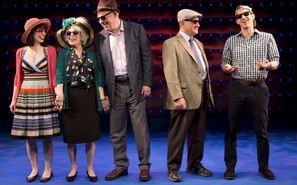SITE GUIDE
SEARCH
REVIEWS
REVIEW ARCHIVES
ADVERTISING AT CURTAINUP
FEATURES
NEWS
Etcetera and
Short Term Listings
LISTINGS
Broadway
Off-Broadway
NYC Restaurants
BOOKS and CDs
OTHER PLACES
Berkshires
London
California
New Jersey
DC
Philadelphia
Elsewhere
QUOTES
TKTS
PLAYWRIGHTS' ALBUMS
LETTERS TO EDITOR
FILM
LINKS
MISCELLANEOUS
Free Updates
Masthead
A CurtainUp Review
Old Jews Telling Jokes
By Elyse Sommer
|
From the time that you are born 'Til life is over. There are moments when it's Kosher for a j\Jew to be a ham! So let us make you laugh, don't Worry we won't dance. If you've got troubles, don't Give them a second glance. The perfect kind of medicine is Right here, folks! It's old Jews, telling jokes — the cast singing about the aim of the revue spawned by a website. |

Audrey Lynn Weston, Marilyn Sokol, Lenny Wolpe, Todd Susman, and Bill Army.
(Photo credit: Joan Marcus) |
The 90-minute intermissionless show has just enough pleasant and also time tested songs (accompanied on the piano by David Corren who also understudies Lenny Wolpe) to lay claim to being a revue. But it's not about whether it's any kind of musical or even qualifies as a genuine theater piece. Whatever the identifying genre, it's all about the jokes that have been passed from Jew to Jew, for years and presenting them with enough show biz pizazz to amuse even those who don't know a kvell from a kvetch.
As Morty (Lenny Wolpe) one of the show's "Old Jews" sings "I Could tell you tales of woe/and Tribulation/But check your ticket. This is not Love, Loss and What I Wore." Wolpe is, of course, referring to the theater's last successful tenant, Nora Ephron and Delia Ephron's adaptation of Ilene Beckerman's touching illustrated memoir.
Though much Jewish humor — for that matter, any humor—- is a way of dealing with sorrows, including disappointing marriages, illness, Old Jews Telling Jokes is too shticky to lend itself to multiple audience viewings as was the case with Love, Loss and What I Wore, and other long running hits in the Westside Theatre's Downstairs venue. And, though you don't have to be old or Jewish to "get" what's funny, if the audience at the press preview I attended is an indication, the chief and most responsive ticket buyers will be at least old enough for AARP membership. Tried and true as the jokes are, a show based on a website called — what else, Old Jews Telling Jokes — is definitely a new concept. Gethers and Okrent have also managed to work their source material into an assemblage that smartly intersperses the full-speed-ahead-to-the punchline shtick with some jokes puffed up into mini-dramedies; case in point: the saga of the infamous Drobkin fart.
To give this jokefest theatrical chops, director Marc Bruni has assembled a quintet of expert jokesters, with two young Jews (Bill Army and Audrey Lynn Weston) added to a trio of old school pros (Lenny Wolpe, Marilyn Sokol and Todd Susman) . All five are obviously having a great time, at times unable to stifle their own laughter. Bruni also enlisted David Gallo, one of the theater's most gifted scenic designers, to provide upstage projections designating the different stages of life being explored and some props to add a humorous visual commentary for the more drawn out segments.
In its more reflective moments, the show stops the yuks long enough to pay tribute to the comedians who made the television set a place of family togetherness as they watched the likes of The Three Stooges, Soupy Sales and Groucho Marx, and listened to record albums by Allan Sherman. Woody Allen, Mort Sahl abd Shelley Berman. As Todd Sussman'sNathan explains, it was a special kind of togetherness "because we were all laughing at the same thing." He admits that the shared laughs didn't keep the family from going their separate ways but sees a continuity and more widely shared laughter through his nine year old grandson whose circle of friends sharing things like YouTube videos of Japanese stand-up comics is in the thousands. As he concludes "It’s very hard to stop “funny” * from spreading like wildfire."
Towards the end of the show, a routine by one of the best of the late great comics, Alan King, is projected on screen and neatly tied in to a skit by Sokol and Wolpe. Good as they are, King manages to steal the scene.
| Old Jews Telling Jokes Conceived by Peter Gethers and Daniel Okrent Directed by Marc Bruni Cast: Bill Army, Marilyn Sokol, Todd Susman, Audrey Lynn Weston and Lenny Wolpe Set and video designer David Gallo Lighting designer: Jeff Croiter Costume designer: Alejo Vietti Sound designer: PeterFitzgerald/ Animation: Steve Channon Stage Manager: William H. Long Running Time: 90 minutes, no intermission Westside Theatre 407 West 43rd Street (212) 239-6200 From 5/01/12; opening 5/20/12. Tickets are $80 Reviewed by Elyse Sommer at 5/16 press preview |
|
REVIEW FEEDBACK Highlight one of the responses below and click "copy" or"CTRL+C"
Paste the highlighted text into the subject line (CTRL+ V): Feel free to add detailed comments in the body of the email. . .also the names and emails of any friends to whom you'd like us to forward a copy of this review. Visit Curtainup's Blog Annex For a feed to reviews and features as they are posted add http://curtainupnewlinks.blogspot.com to your reader Curtainup at Facebook . . . Curtainup at Twitter Subscribe to our FREE email updates: E-mail: esommer@curtainup.comesommer@curtainup.com put SUBSCRIBE CURTAINUP EMAIL UPDATE in the subject line and your full name and email address in the body of the message. If you can spare a minute, tell us how you came to CurtainUp and from what part of the country. |

Slings & Arrows- view 1st episode free
 Anything Goes Cast Recording
Anything Goes Cast RecordingOur review of the show
 Book of Mormon -CD
Book of Mormon -CDOur review of the show

